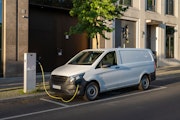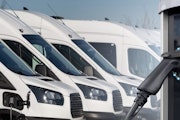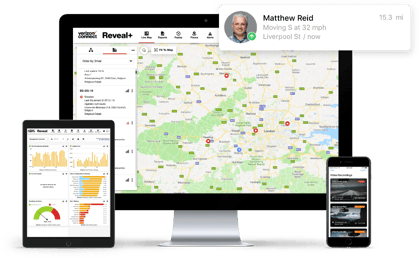2025 Fleet Technology Trends Report Europe
Find out how fleet management technologies can help improve the bottom line of your business.
Read more
Fleet managers in the UK are constantly striving to gain more knowledge and improve their skills so they can apply them in their company. They are in charge of daily operations and ensuring that processes run as efficiently and smoothly as possible. However, one of their main responsibilities is also to maintain the safety of the company’s equipment and vehicles. They are the true leaders when it comes to achieving a safe and sustainable company.
Fleet safety is paramount. And that ranges from maintaining vehicles, to choosing safe routes, avoiding road works, bypassing traffic jams and promoting a safe driving culture. Fleet managers prioritise the safety of their team, and advanced fleet management technology can help them achieve these high levels of safety.
Let’s take a look at how fleet management technology can benefit fleet managers:
By enhancing fleet safety during daily operations: GPS and telematics technology allow businesses to prioritise their team’s safety. You can track your fleet in near real-time and obtain valuable data on driver behaviour and vehicle performance, which means that if there is an emergency, you can take quick action and get help.
By establishing a safe driving culture: Driver behaviour is directly linked to the risk of accidents and the safety of drivers and vehicles. In fact, speed has been found to be a major contributory factor regarding road casualties in the UK. (1) According to the Department for Transport, speed was a major contributory factor in road traffic accidents. (2)
By planning your routes to boost safety: Route planning can help decrease the risk of accidents. As an employer, the safety of your team should be your main concern. Choosing safe routes and not covering more miles than necessary should be one of the KPIs of your daily operations and long-term strategy.
Regarding fleet safety, GPS tracking solutions improve the safety of teams and fleets on a daily basis. More than half of respondents (39%) said GPS tracking solutions helped improve safety and 48% improved routing.
By assisting with vehicle maintenance scheduling: GPS tracking solutions can help to combine preventive and predictive vehicle maintenance and help keep your fleet in optimal condition so that the vehicles can be used safely by the team.
Furthermore, GPS tracking solutions also assist fleet managers in extending the life of their vehicles and achieving a profitable ROI. Insights obtained from telematics solutions help fleets identify optimal maintenance intervals and stay on top of maintenance scheduling.
Also, 23% of respondents said GPS tracking solutions improved preventive maintenance which helps to keep vehicles roadworthy for longer and contributes to less vehicle wear and tear.
Fleet managers are the new sustainability leaders because they help their company become greener. Consumers and governments are demanding that companies commit to making their fleets greener so they have less impact on the environment.
In this sense, the UK has set “the most ambitious target to reduce carbon emissions by 68% compared to 1990 levels by 2030 – and is the only major economy to have set a target of 77% for 2035”. (3)
Although the ban “on the sale of petrol and diesel cars will be pushed back to 2035” the carbon emissions target of a 77% reduction by 2035 is still in place. (4)
Let’s see how fleet management can help fleet managers become green fleet leaders:
By cutting down on unnecessary idling: Longer idling time increases fuel consumption and vehicle wear and tear. According to research, “the estimated fuel consumption of an idling engine is 0.6 litres / hr per litre of engine displacement. This means that an idling 3.5 litre engine consumes more than 2 litres of fuel per hour”. (5)
By increasing fuel efficiency: Coaching your drivers in eco-driving techniques and monitoring their behaviour behind the wheel can make all the difference to your whole business. In fact, the most important and immediate benefit of eco-driving is cost savings.
The Department of Transport explains that with eco-driving techniques fleets can “reduce their fuel bill by 20% on average. And that’s quite a lot of money, you know, if you consider some companies have individual drivers travelling 48,280 kilometers. That one driver could easily save £1000 a year” (6)
By lowering carbon emissions across your entire fleet: With the new CO2 standards, all fleets are facing the challenge of becoming greener and reducing their carbon emissions by 68% by 2030 (7) in order to contribute to a zero-neutral future.
The transport sector needs to move fast to become greener because it is one of the “sectors emitting the largest amount of greenhouse gas (GHG) emissions” in the UK (8).
Fleet based businesses in the UK need to be part of the solution to reduce emissions and become green and sustainable businesses.
The last Fleet Technology Trends Report Europe 2025 revealed that 25% of GPS tracking users were able to reduce CO2 emissions and contribute to becoming a greener fleet and 48% improved sustainability within this new sustainable ideal.
By promoting a green top-notch vehicle maintenance program: The main objective of vehicle maintenance is ensuring that the equipment is safe to use. This need to be complemented with a vision that combines safety, sustainability and respect (commitment) for the environment.
A green vehicle maintenance program takes the carbon footprint into account for the entire vehicle fleet as well as the amount of CO2 being released into the atmosphere. In addition to this, there are also emissions resulting from wear and tear or from the tyres or brakes that may result in more CO2 in the atmosphere (not to mention a higher fuel consumption).
All these points will be included in this new comprehensive maintenance program (preventive and predictive) for all vehicles in the fleet. The program also places safety and sustainability at the heart of the company’s strategy.
By working with vehicles on a daily basis, fleet managers learn how to improve the most strategic areas of the company so they can continue to advance and not stagnate.
Talking specifically about the areas of safety and sustainability, basic daily actions would include:
- Monitoring the team’s driving behaviour and taking action to prevent bad driving practices.
- Analysing the planned routes (which ones are safer, where have accidents occured, which are susceptible to traffic jams, etc.).
- Knowing precisely which vehicles require more maintenance (due to mileage, type of use, etc.).
- Knowing each fleet vehicle’s carbon footprint,
- Monitoring gas emissions and the direct relationship with fuel consumption.
All these actions are part of the daily life of these mobility professionals and having the most innovative fleet management technologies can provide a significant competitive advantage.
Advanced platforms that collect real-time information on safety or sustainability, and that allow the data to be easily interpreted, can make such a difference to a company and its safety and sustainability journey.
Learn how companies in the UK have improved safety, sustainability and many strategic areas in their business after implementing an advanced fleet management solution
Download the Fleet Technology Trends Report Europe 2025 or request a demo to see it in action.




Find out how our platform gives you the visibility you need to get more done.
Find out how fleet management technologies can help improve the bottom line of your business.
Read moreCompanies that utilise fleet management software revealed a lot about fleet management trends for 2025. What are they?
Read moreFleet management technologies can help conquer the challenges that fleet managers often come across. Find out how here.
Read moreFleet management companies benefit from GPS tracking in their daily business. Here are the main improvements.
Read more